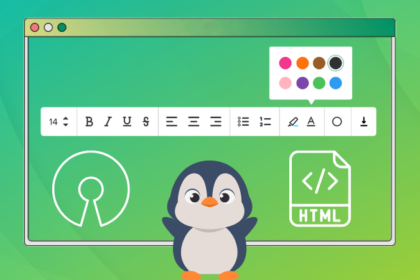
WYSIWYG (What You See Is What You Get) editors are self-explanatory. Whatever you see when editing is what you, a reader/user see.
Whether you want to build your content management system, or aim to provide an editor to the end-user of your application, an open-source WYSIWYG editor will help provide a secure, modern, and scalable experience. Of course, you also get the technical freedom to customize open-source WYSIWYG editors to meet your requirements.
Here, we look at some of the best open-source WYSIWYG editors.
A document editor must be fast for some users and loaded with features.
Similarly, what are some of the key highlights that you should look at when selecting an HTML editor? Let me give you some pointers here:
When selecting an open-source HTML editor for your app or website, you should look for these essential aspects.
Keeping these in mind, let me mention some of the best options to try.
Note: The editors are in no particular order of ranking. You may choose the best for your use case.
CKEditor 5 is a feature-rich and open-source WYSIWYG editing solution with great flexibility. The user interface looks modern. Hence, you may expect a modern user experience.
It offers a free edition and a premium plan with extra features. CKEditor is a popular option among enterprises and several publications with a custom Content Management System (CMS), for which they provide technical support and custom deployment options.
CKeditor’s free edition should provide basic editing capabilities if you do not need an enterprise-grade offering. Check out its GitHub page to explore.
Froala is an exciting web editor that you can easily integrate with your existing open-source CMS like WordPress.
It provides a simple user interface with the ability to extend its functionality through default plugins. You can use it as a simple editor or add more tools to the interface for a powerful editing experience.
You can self-host it, but to access its mobile apps and premium support, you must opt for one of the paid plans. Head to its GitHub page to explore more.
TinyMCE is an incredibly popular option for users looking to use a solid editor with several integration options.
TinyMCE was the editor powering WordPress with proven flexibility and ease of use for all users. Unless you want real-time collaboration and cloud deployments at your disposal, TinyMCE’s free self-hosted edition should serve you well.
It is a lightweight option with essential features to work with. Check out more about it on its GitHub page.
Do you like Slack’s in-app editor or LinkedIn’s web editor? Quilljs is what they use to offer that experience.
If you are looking for a polished free, open-source WYSIWYG editor with no premium frills, Quill (or Quilljs) should be the perfect text editor. It is a lightweight editor with a minimal user interface that allows you to customize or add your extensions to scale their functionalities per your requirements.
To explore its technical details, head to its GitHub page.
Aloha Editor is a simple and fast HTML5 WYSIWYG editor that lets you edit the content on the front end.
You can download and use it for free. But, if you need professional help, you can contact them for paid options. Its GitHub page should be the perfect place to explore its technical details.
Editor.js gives you the perks of a block-style editor. The headings, paragraphs, and other items are all separate blocks, which makes them editable while not affecting the rest of the content.
It is an entirely free and open-source project with no premium extras available for upgrade. However, there are several plugins to extend the features, and you can also explore its GitHub page for more info.
Note: This project hasn’t seen any new activity for more than a year when writing.
Trix is an open-source project by the creators of Ruby on Rails.
If you want something different for a change, with the basic functionalities of a web editor, Trix can be a pick. The project describes that it is built for the modern web.
Trix is not a popular option, but it is a respectable project that lets tinkerers try something different for their website or app. You can explore more on its GitHub page.
Want something similar to TincyMCE but simpler? Summernote can be a good choice.
It provides the look and feel of a classic web editor without any fancy modern UX elements. The focus of this editor is to offer a simple and fast experience along with the ability to add plugins and connectors.
You also get to change the themes according to Bootstraps used. Yes, an editor on Bootstrap. Explore more about it on its GitHub page.
Want to edit HTML pages from the front end? Well, ContentTools lets you do that pretty quickly.
While it can be integrated with a CMS, it may not be a preferred pick for the job. You can take a look around at its GitHub page as well.
Toast UI editor will be a perfect fit if you deal with Markdown documents to publish web pages.
It offers a live preview and a few essential options for edits. You also get a dark theme and plugin support for extended functions.
While it does provide useful features, it may not be a feature-rich editor for all. Learn more about it on its GitHub page.
Jodit is a TypeScript-based WYSIWYG editor that makes no use of additional libraries.
It is a simple and helpful editor with all the essential editing features, including drag-and-drop support and a plugin system to extend functionalities.
The user experience is much similar to WordPress’s classic editor or TinyMCE. You can opt for its pro version to access additional plugins and technical support. Head to its GitHub page to explore technical details.
Key Features:
SCEditor is yet another simple open-source WYSIWYG editor. It may not be popular enough, but it has been actively maintained for more than six years since publishing.
By default, it does not feature drag-and-drop support, but you can add it using a plugin. There is scope for using multiple themes and customizing the icons as well. Learn more about it on its GitHub page.
Like the last one, SunEditor is not popular enough but works well with its simple and feature-rich offering.
It is based on pure JavaScript with no dependencies. You should be able to copy from Microsoft Word and Excel without issues.
Additionally, one can use KaTex (math plugin) as well. It gives you complete freedom with custom plugins as well. There are no premium extras here. Head to its GitHub page to check out its recent releases.
ProseMirror is an exciting choice for free for users who want collaborative editing capabilities. Most of the WYSIWYG editors offer the collaboration feature for a premium. But here, you can work with others on the same document in real-time (for free).
It provides a modular architecture that makes maintenance and development more accessible compared to others.
Explore more about it on its GitHub page.
Depending on the type of use case, it is easy to pick a WYSIWYG, an open-source editor.
If you want to focus on the out-of-the-box experience and reduce efforts to maintain it, any option that provides premium technical support should be a good choice.
If you are more of a DIY user, you should do anything that serves your requirements.
Note that a popular option does not mean that it is a flawless editor for your requirements. Sometimes a more straightforward option is a better solution than a feature-rich editor.
So, what would be your favorite open-source HTML editor? Let me know in the comments below.
A passionate technophile who also happens to be a Computer Science graduate. You will usually see cats dancing to the beautiful tunes sung by him.
Here are several ways you can take screenshots and edit the screenshots by adding text, arrows etc. Instructions and mentioned screenshot tools are valid for Ubuntu and other major Linux distributions.
Read More Best Tools For Taking and Editing Screenshots in Linux
A list of both graphical and command-line user interface tools for recording desktop session as GIF in Linux.
Read More Best GIF Recorder Tools for Linux
Here are the best open source tools to create interactive fiction in Linux.
Read More 5 Open Source Tools to Create Interactive Fiction
Stop Google from spying on you. Use these alternative search engines that do not track you.
Read More 10 Privacy Oriented Alternative Search Engines To Google
Fanless and noiseless computer inside a compact body. These are the best Linux mini PCs you can buy today.
Read More 11 Mini PCs That Come With Linux Pre-installed
A good to-do list app helps you organize your work and be more productive by focusing on important work. Here are the best to-do list apps for Linux desktop.
Read More Get Your Work Done Faster With These To-Do List Apps on Linux Desktop
Also, take a look at lexical.js. It’s basically a replacement for DraftJS.
https://github.com/facebook/lexical
From my previous experience, I can say that Froala products are a joke.
i agree
Hi. Can you please also include Publii? It’s open source cross platform and beginner friendly.
Thanks for the note. We’ll check it out and update it if it fits.
Your sharp observation skill and intellect have identified a potential issue with this article.
Is it a grammatical mistake or a simple typo? That happens from time to time.
Is there some incorrect technical information? It’s possible that we were not clear on the topic.
Part of the article contains outdated steps or commands? We have over 1500 articles in the last ten years. It’s possible that some articles that worked well five years ago won’t work today.
Is there an issue with the UI and UX of the website? Some button not working? Link leading to a dead page? Or any other issue with the website elements?
Dear Holmes, help your Watson (that’s us) by explaining the details.
© CC-by-SA | It's FOSS is part of CHMOD777 Media Tech Pvt Ltd
Session expired
Please log in again. The login page will open in a new tab. After logging in you can close it and return to this page.




